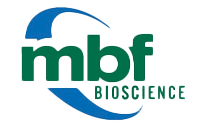
Increased Choline During Pregnancy Improves Learning in Down Syndrome Mice
Obstetricians and midwifes have long hailed the benefits of folic acid during pregnancy. Now new research offers evidence that choline is another important nutrient for the developing fetus. Found in foods like eggs and cauliflower, choline is known to aid healthy liver function. But in the past few years, studies have shown that the nutrient also plays a role in brain development. One recent study by Velasquez and colleagues claims that increased choline during pregnancy may offer a possible therapy for Down syndrome.
The study describes improvements in spatial cognition and increases in neurogenesis in an adult mouse model of Down syndrome – a disorder characterized by decreased intellectual capacity and early onset of dementia.
To test whether or not choline supplementation would have an impact on learning and memory in adulthood, the research group raised a population of mice, half of which were models of Down syndrome (Ts65Dn mice). Half of the Down syndrome mice and half of the normal mice were birthed by mothers which were given four and a half times more choline than the other mothers in their diets during pregnancy and lactation, while the mothers of the other half of each group ate foods with standard levels of the nutrient.
Using Stereo Investigator to conduct an unbiased stereological study, the researchers observed a higher level of new cells in the supplemented Down syndrome adult mice. The scientists used the optical fractionator method to quantify cells labeled with doublecortin (DCX), a marker for immature neurons, in the hippocampus, a brain region associated with learning and memory. These mice also performed better than non-supplemented Down syndrome mice in a radial arm water maze, leading the scientists to speculate on the existence of a link between increased neurogenesis and enhanced spatial learning.
“The present study demonstrated that supplementing the maternal diet with additional choline during pregnancy and lactation improves spatial cognition and hippocampal neurogenesis in adult Ts65Dn offspring. If these findings generalize to humans, [maternal choline supplementation] could provide a therapy to normalize brain development and cognitive function in [Down syndrome] as well as possibly slow the neurodegeneration associated with both Down syndrome and Alzheimer’s disease,” the authors say in their paper.
Velazquez, R., Ash, J. A., Powers, B. E., Kelley, C. M., Strawderman, M., Luscher, Z. I., Ginsberg, S., Mufson, E., Strupp, B. J. (2013). Maternal choline supplementation improves spatial learning and adult hippocampal neurogenesis in the Ts65Dn mouse model of Down syndrome. Neurobiology of Disease. doi: 10.1016/j.nbd.2013.04.016


